GM Citizens’ local campaign priorities for change
Founded in 2017, GM (Greater Manchester) Citizens is an independent alliance of civil society organisations acting together for the common good and social justice. Through the method of broad based community organising, we train local leaders to win change and strengthen their communities.
A year ago, during the summer of 2023, we launched a listening campaign to identify what was putting pressure on people served by our member organisations. We heard powerful stories of individuals and families affected by the cost-of-living crisis, as well as from many who felt they can be ‘sent pillar to post’ when they sought help from authorities.
So, we turned these stories into specific issues for our community organising campaigns. They covered three priority areas of the real living wage, mental health and universal credit.
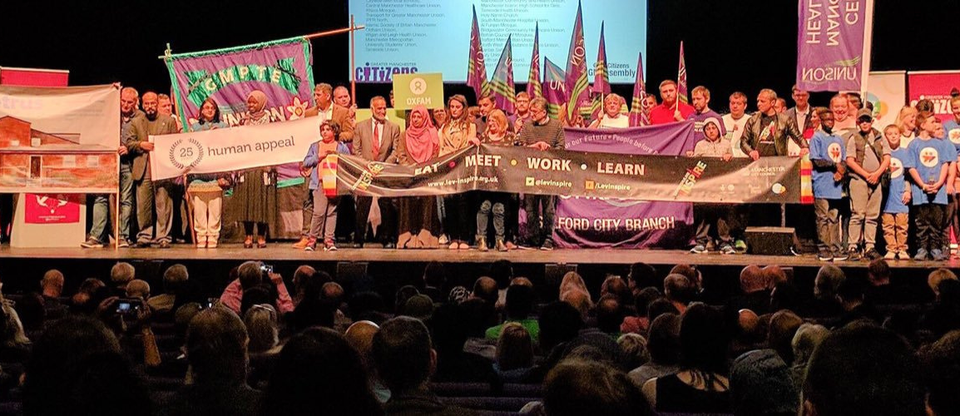
Weeks before the regional elections in May 2024, our Leadership Team met with the two main Mayoral candidates: Laura Evans (Conservative Party) and Andy Burnham (Labour Party), putting our priorities to them for their pledges of action.
In this blog, we outline the specific asks on each of our priorities and the responses to them by the re-elected Mayor of Greater Manchester, Andy Burnham.
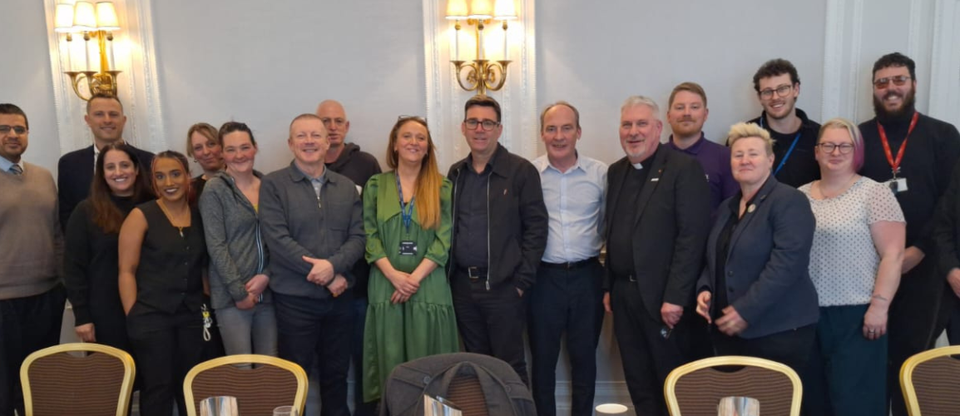
The Real Living Wage
The real Living Wage is the only UK wage rate based on the cost of living. It is voluntarily paid by over 15,000 UK businesses who believe their staff deserve a wage which meets every day needs - like the weekly shop, or a surprise trip to the dentist.
The UK Living Wage for outside of London is currently £12.00 per hour. The London Living Wage is currently £13.15 per hour. It changes annually in November. The real Living Wage rate is higher than the minimum wage (£8.60 p/h) or the national living wage (£11.44 p/h) by government because it is independently-calculated based on what people need to get by. That's why we encourage all employers that can afford to, to ensure their employees earn a wage that meets the costs of living, not just the government minimum.
GM Citizens have a long history of campaigning with others to persuade employers in the region to pay and accredit as Living Wage employers. We are delighted to be part of a regional movement led by the Living Wage Foundation backed by the Mayor of Greater Manchester calling on every employer to pay it.
Currently, there are 764 living wage accredited employers in our region giving over 26,000 workers an uplift to their pay. Whilst this is positive news, we are particularly concerned for care workers, the unsung heroes of our region, many who still face tough working conditions on below the living wage.
Our specific asks to the mayoral candidates were:
- Commit to growing Greater Manchester as a Real Living Wage region by ensuring every council within it is accredited as a RLW employer.
- Ensure every health & care worker is paid at least the Real Living Wage for every hour worked (including sleep-in shifts and in-work travel time), calling on the National Government to provide sufficient funding, delivery mechanisms and guidance for this to be implemented across the UK.
- Use the Good Employment Charter as the benchmark.
Andy Burnham agreed to all of the above asks, sharing his intention to establish a standing Commission on Social Care, inviting GM Citizens to play a role in shaping and contributing to it. He stressed his starting point was workforce stability.
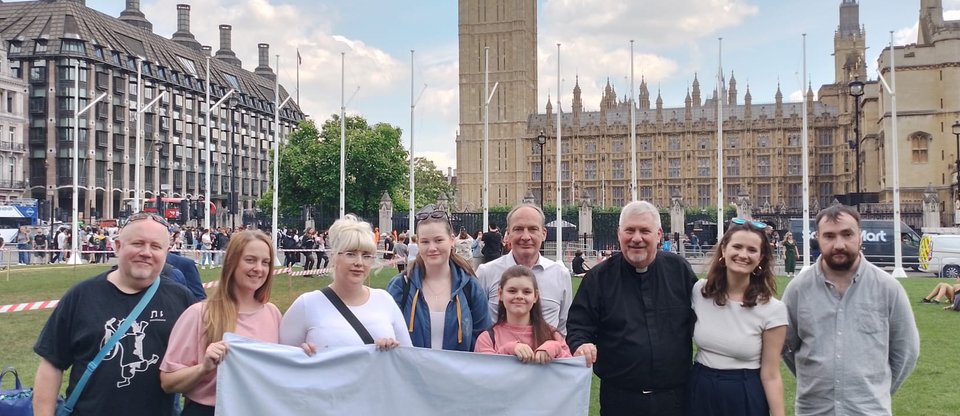
Mental Health
We identified the need to improve the experience of accessing mental health services by young people and students, whether it is during a crisis requiring visiting A&E, or on securing mental health counselling in schools, or help during university.
Mary's Story:
This story contains details which may be upsetting for some readers:
"It was March 10th 2020, that I received phone call from my son’s college Tutor asking me to go into college as soon as I could for a conversation. The conversation I had when I arrived was not at all what I had expected. I was asked a very simple question… Did I know that Tom had attempted to take his life the night before? My answer was simple… No I didn’t.
I don’t remember much of the rest of that conversation, other than that I was told that he had dressed the wounds extremely well, essentially saving his own life, but he needed to have them checked by the hospital.
That was the first time we went to A&E. He was 16 years old. Just 4 months off turning 17.
His college were amazing over the next couple of days and were putting together a support package, but on the 16th of March we went in to the first wave of lockdowns for the Covid Pandemic. And everything changed.
Covid is not to blame for much of what happened next. It didn’t help, but I think a lot of what Tom went through over the following months just brought to the fore just how broken the system was, and still is.
During the next 8 months Tom self-harmed to the point that he had absolutely no where left on his body to cut. The day I saw the bloodied marks down the back of his neck broke me. Along with self harm, he also made 2 further attempts on his life.
On our second visit to A&E I was told that covid regulations meant that I couldn’t be let in with him because Tom was over 16 – so adult enough to sit by himself despite his obvious mental health distress. Tom tells me that I went ‘MamaBear’ on the security... and they conceded and let me sit with him for 5 hours until the Crisis Team could see him. When he eventually saw someone from Crisis Team though, they treated him like a child. In the end we had 4 visits to A&E trying to get some kind of crisis support for Tom.
Each time, we waited hours and hours to see someone. Each time, Tom was treated like a child. Each time, Tom left without any ongoing support, other than the words ‘You’re on the referral list".
And so we waited. And waited. And waited for a referral.
In between, the GP diagnosed him with ‘suspected’ anxiety, social anxiety, depression, and PTSD. He couldn’t get a confirmed diagnosis until he saw CAMHS. Just shortly before Tom turned 18, he received a letter from CAMHS. Finally, a chink of light down an already too long tunnel.
When he opened the letter though, it said that because he was nearly 18 he was no longer eligible to access CAMHS and therefore was being removed from their list. He was distraught!
I contacted CAMHS and asked what the next step of the process was. I was informed that he would now need to wait till he was 18, then go to his GP and seek an adult Mental Health services referral. I asked how much longer he would need to wait to be seen. They told me that he would go back to the bottom of the list, and the wait at that time was at least 18 months. I responded that he’d already been waiting 18 months. Their response… different service, different waiting list.
He never did go back to the GP. Why would he... he no longer trusted the medical professionals. Instead, he bought a motorbike. And since then, he has used that as his treatment for his mental health problems.
There must be a better way to provide Mental Health services to our young people when it is obvious that they will ‘age out’ the CAMHS waiting list. One which means that there is a cross over between the lists. One which sees a person, not solely based on their age, but based on their mental health needs. One where trust in many of societies systems isn’t lost, because – in the words of 16-year-old Tom – ‘they just didn’t listen to me like a person’.
Tom is 21 in 3 months. He has developed a bug for travelling and is off to Australia for 3 years from September. He still struggles with his mental health."
Unfortunately, Mary’s powerful story is not rare as much as it truly heartbreaking. The GM Integrated Care Partnership has recently updated its five-year strategy on mental health. We welcome its vision and mission.
We recognise and welcome the work of the Greater Manchester Universities Student Mental Health Service, but seeing more collaborative work between the combined authority and the Universities to work with more students would be welcomed. An example would be including students in the progress of the regional mental health strategy.
In 2022, a survey of GPs reported that half said 60% of their referrals to CAMHS (Childhood & Adolescent Mental Health Service) were rejected because their symptoms were not severe enough, even though only the most at-risk children and young people are referred.
We know that school and college-based counselling is a proven intervention for children and young people experiencing psychological distress. Counselling in schools and colleges has also been shown to minimise pressure on Child and Adolescent Mental Health Services.
Our asks for the next Mayor of Greater Manchester were as follows:
- Pilot mental health counselling in schools and colleges across Greater Manchester.
- Expand access to mental health services for students by working collaboratively with student leaders to shape them.
- Automatic transfer and transition from the child & adolescent mental health services waiting lists to the adult version so that young people don’t age out, lose their place and go to the bottom of the list through no fault of their own. Priority needs to be based on need, not what age you are when you are referred.
Andy Burnham shared the region did previously pilot mental health provision in schools and he was open to it, but shared concern on how it can be funded. We informed him Citizens UK is also campaigning for it nationally, to secure funding from the new government.
He agreed to working with student leaders on exploring expanding access to mental health services. Finally, he committed to convene a meeting with Richard Leese (Chair of ICB) and Paul Dennett (Mayor of Salford + policy lead for GMCA) to end the cliff edge from CAMHS to adult waiting lists.
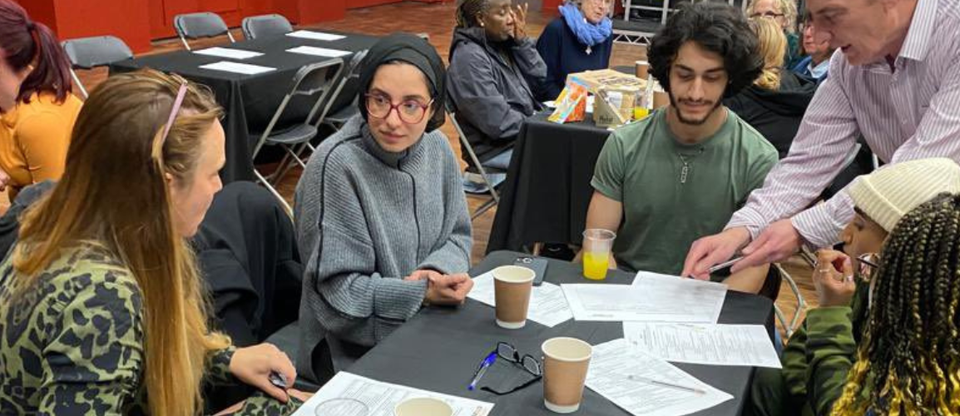
Universal Credit
During our listening campaign, we heard how difficult it was to navigate Universal Credit for those who are vulnerable, affected by homelessness, mental health and other complex well-being issues. We heard stories of the gap between what local jobcentres are meant to offer to what actually happens on the ground during our workshops.
Claire's Story:
This story contains details which may be upsetting for some readers:
"My name is Claire and I am a service user of Petrus services. I’d like to share with you my experience of being sanctioned from benefits. In November of last year I had a benefits appointment and was very poorly. I couldn’t make the appointment as I didn’t want to make this worse by going out on a cold and snowy day and had no means of transport and was suffering from a fever. My on-line journal said to email the jobcentre which I did. I then received an email back saying an abscess was not a good enough reason not to attend and I would be sanctioned and this was being sent to somebody else who will make the final decision. This person then confirmed I would be sanctioned.
I received £140 for two months after the sanction was applied. I suffer with anxiety and this made me feel sick with worry, my diabetes and dealing with this while being not being able to eat or heat my home made my position feel so much worse, I didn’t know where to turn with stress. I went into Petrus Hub to see staff about this. The staff advised I went into the job centre and see somebody face to face, which I did. The person there reassured me that I would not be sanctioned, this made me feel so much better.
On payday I discovered I had been sanctioned which then sent me into meltdown about how I was going to survive. I have always followed what is asked of me by DWP and look for work, but this one time I was unable to and followed procedure, had a knock on effect on the whole of my life, I thought I might lose my accommodation, not get well as the stress added to my recovery, I couldn’t afford to eat properly or heat my home."
Under the new ‘Devolution Deal’, the Mayor of Greater Manchester now has the power to impact the experiences of vulnerable people out-of-work claiming Universal Credit:
“Working with the Department for Work and Pensions, there will also be co-design of all future contracted employment support programmes, consideration of potential employment support pilots and commitments to data sharing to ensure provision addresses labour market inactivity, supported by a new joint board. This will allow Greater Manchester and the government to provide a more responsive service to support particular groups back into employment bringing together partners, including health, to improve provision.”
Source: Greater Manchester strikes trailblazing new devolution deal – “New era for English devolution” - Greater Manchester Combined Authority (greatermanchester-ca.gov.uk)
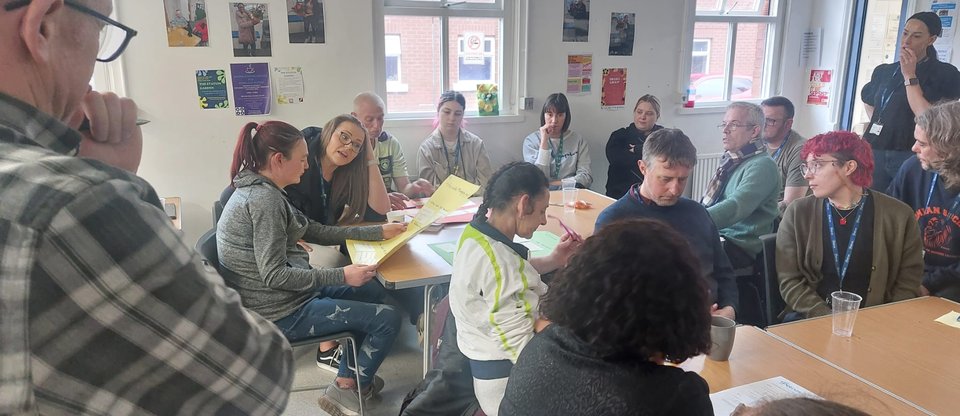
Our asks for the next Mayor of Greater Manchester were as follows:
- Offer us a seat at the table to work with the Mayor of Manchester, the DWP and other agencies, to co-design employment support, and to improve the experiences of vulnerable people on Universal Credit.
- Introduce a single point of contact at centres GM Citizens to escalate and resolve Universal Credit casework affecting the vulnerable people with complex needs that we serve.
- Oversee bringing in mandatory training for DWP staff around understanding the needs and nuances of offering a service to people experiencing homelessness, and people from a refugee and migrant background, and that those groups receive training from the DWP.
Andy Burnham agreed to all of our asks on Universal Credit above, inviting us to work with him on the Live Well Service across Greater Manchester.
Relationship
We welcomed Andy Burnham’s commitment to work with us on all our priorities, and strengthen relationships with local communities across our alliance to deliver positive change. We particularly welcome Mr Burnham’s agreement to meet with us again in Autumn and next Summer to discuss progress.
For further info, contact: sophie.morbey@citizensuk.org
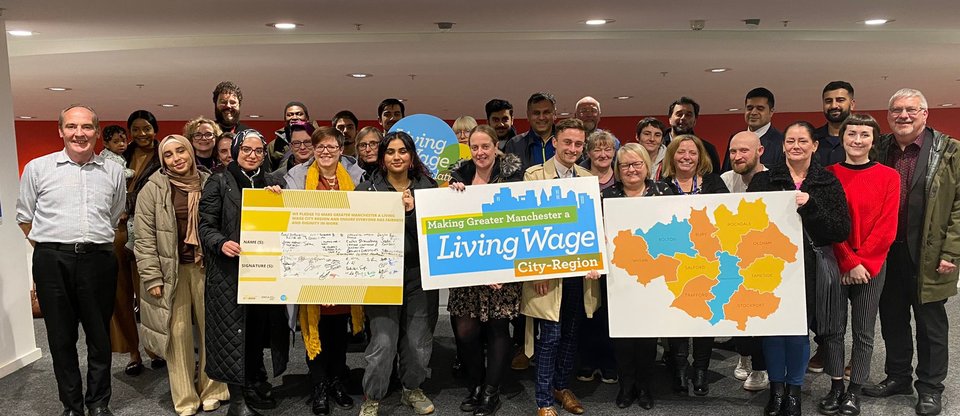

Get involved in Greater Manchester Citizens




